In the corner of Dos Amigos, a six-table taqueria located in the heart of the Polytechnic Heights neighborhood, the TV is blaring Univision, but that sound is mostly drowned out by the clattering of pots, pans, and dishes, plus a steady stream of to-go orders this Saturday night before the coronavirus turned our world upside down. Inside, the walls are burnt orange, but the air is filled with the savory aromas of [frijoles], pollo, carne, arroz rojo, tripas, puerco, and other mouth-watering delights.
I’m at a table in the back, visiting with the owner’s son, Hugo Ceja, a senior at Trimble Tech High School. This March, he was ranked third in a class of more than 400 students. His GPA is 4.45. His teachers, principal, and counselors all sing the praises of this mature, well-spoken young man. He’s been a student leader, founding C.O.N.N.E.C.T., a club dealing with racism, and has been asked to speak at a national LatinX Conference in Houston. He was one of 93,000 who applied nationally for a Coca-Cola Scholarship, but now he is one of 251 finalists, the only student in the Fort Worth school district to be so named.
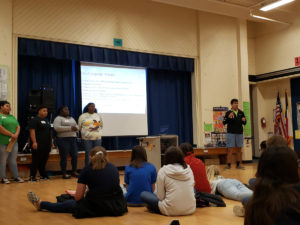
Courtesy of Hugo Ceja
But Hugo is no son of affluent parents who could afford to send him to private schools and lavish him with tutors galore. He is a product of Fort Worth ISD. His parents are Mexican immigrants and small business owners. Truly from humble origins, he’s had to work hard to reach his goals. In fact, his life could have turned out very differently. And he can point at the exact moment when that occurred.
In the summer of his freshman year, he enrolled in a program in Carbondale, Colorado, called HS2 (High School Squared), which, as its website explains, is “a rigorous STEM-based summer enrichment program … [for] underserved communities.” At the time, Hugo says, he was displaying “an unhealthy level of self-esteem.”
He was “very cocky,” he admits, shaking his head. “I did not listen.”
He was so overconfident, in fact, he ended up being drummed out of the program for not following instructions, but the very worst part was when he had to explain to his parents how he had failed. The shame of that moment led him to reflect on what he had done and adjust his attitude.
Hugo’s father, Dos Amigos’ owner for the past 20 years, finally gets a chance to come out to greet me. Built like a boxer, he seems a man with boundless energy.
“Is he telling you the truth?” Ceja jokes, pointing at his son, who shares his first name. We laugh.
Ceja wants to know if I want something to eat. Of course, I tell him. I’m at a Fort Worth taqueria. I’ve got to eat something. It’s mandatory.
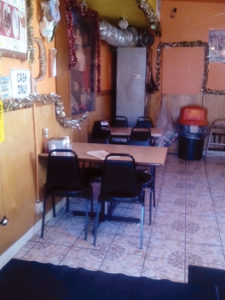
Courtesy of Hugo Ceja
After his father goes back to the kitchen, Hugo reveals that his change in attitude led him to become more socially conscious. Returning to Trimble Tech his sophomore year, he noticed lots of racial tension. At a campus with students from all over the world, people regularly made fun of others of different ethnic origins, he says, and during lunch, most students self-segregated, only hanging with their own kind. Hugo decided to start the C.O.N.N.E.C.T. Club to tackle racism head-on, to show that all students, regardless of where they came from, had more in common with one another than not.
Another of Hugo’s main motivations for forming C.O.N.N.E.C.T. was his father’s experience when he first came to America. While working as a dishwasher at a restaurant, Ceja shared with the owner his big dream of one day opening his own place. With a few gruff words, his boss totally annihilated him. Forget about it, the man scoffed. You’re “a wetback.”
Words, Hugo says calmly, fighting back emotion, “have meaning.”
Importantly, Hugo wanted to include in his club Trimble Tech students who also participated in Success High School, a program for over-aged and under-credited students to prepare them for graduation and college or the workforce. Many Success students are new immigrants who have had to deal with racism daily, much as Hugo’s father had to when he arrived.
At first, C.O.N.N.E.C.T. worked hard to improve racial tensions at Trimble Tech and Success, but the club also went to elementary and middle schools to discuss the scourge of racism. At the elementary level, they talked about kindness and respect. For middle schoolers, they tackled a more difficult topic: Was it right to use the N-word or other inappropriate racial epithets?
Crystal Mercer, the group’s faculty sponsor, says in an email that Hugo was “able to connect with second-grade students.” In fact, she found it “inspiring to see him connect with people of all ages.”
For Hugo’s part, he was surprised at how attentive the middle schoolers were. Later he was told that C.O.N.N.E.C.T.’s presentation had produced a lot of discussions among the students, which made him feel good.
“We’re just a little older than them,” Hugo says. “They could relate [to us] in a way.”
When I ask if his group had made a difference at Trimble Tech, Hugo at first says it’s hard to know, but he adds that he thinks there’s been an improvement at lunch. It’s not quite as self-segregated as it had been his sophomore year.

Courtesy of Hugo Ceja
But that’s not the only club Hugo is involved in. As a self-described avid reader, Hugo began devouring what he could about climate change, including predictions of its severity by the United Nations Intergovernmental Panel on Climate Change. Because of that wake-up call, Hugo reinvigorated Trimble Tech’s Green Earth Club. As described by Cynthia Jankowski, the club’s sponsor, “Hugo comes along and reforms the club and builds the highest membership we have had through his passion and enthusiasm for the environment.”
The club meets every Monday, discussing such topics as food waste, greenhouse gas emissions, and the climate crisis, but the organization is not just a place for soapbox discussions of these terribly important issues. The students have also acted. The club has reintroduced recycling at Trimble Tech, picking up recycling bins every Tuesday. The club has also participated in several trash cleanups in the community and raised money for Australia after its devastating wildfires.
While Hugo has led clubs featuring two of the weightiest issues of the day, being a social justice warrior is not all there is to him by a longshot. He describes himself as a budding entrepreneur, identifying Tesla founder Elon Musk and Dallas Mavericks owner Mark Cuban as his personal heroes.
Taking no backseat to them, a list of Hugo’s entrepreneurial endeavors is enough to make your head spin. Some years back, he came up with the idea of making and selling arroz con leche (rice pudding). Every night, he would whip up a batch and put it in cups. The next day, he’d schlep them to school in a cooler and sell them, but that’s not all. When he came home, he hawked them door-to-door throughout his neighborhood, facing the problem since time immemorial of doors being slammed in his face. But with his neighborhood being mostly Hispanic, his perseverance paid off, and many neighbors began to look forward to buying their desserts from Hugo.
During his junior year, he was also part of a team selling fuzzy socks, a project for his entrepreneurial class. One person in his group quit, Hugo says, because she thought their goal of selling 500 fuzzy socks was totally unrealistic, but with a lot of hustle, Hugo and his friend proved her wrong.
Currently, he has a startup cellphone repair business, replacing screens and doing other minor repairs. Over the past two and a half years, his work has grown by word of mouth, passing out business cards, and with the help of Snapchat. Normally, he fixes two to three phones a week, he says. Understand that he does that at the same time he is burdened with tons of homework, participates in two clubs, and works regularly at his dad’s taqueria.
But Hugo’s get-up-and-go is nothing new. It’s been part of his makeup for years. Since he was 8 years old, he has worked at his dad’s restaurant. At first, his father didn’t make him do the most “gruesome” work, as Hugo describes it, but over the years, he’s done a little bit of everything: bused tables, performed minor maintenance, worked the register, cooked, washed dishes.
From his father, Hugo has learned more than how to run a restaurant. He’s learned lessons in life. One of his dad’s most important lessons was to never put down manual labor, like sweeping floors. Besides that dose of humility, Hugo has learned the hard way to get the orders right. When he got them wrong, his dad punished him by making him do his least favorite job: washing dishes.
Hugo’s work ethic was also honed by summers in El Cortijo, Guadalajara, a small village that is his family’s ancestral home. There he didn’t spend long, lazy summers working on his tan at some all-inclusive resort. He spent one summer working on a raised-cement masonry burial plot for his grandmother. In Mexico, he explains, burials are different from here. You have to buy the plot, but the families are responsible for constructing the grave site. It was hard work under the unrelenting Mexican sol with many hours of mixing cement and digging holes. Undaunted, the next summer he again worked with cement, this time making an irrigation canal. But Hugo being Hugo, long days digging in the heat wasn’t enough. He also had a side-business, going door-to-door installing older video games on televisions. He counts himself lucky to have had those formative experiences.
Like many of his generation, he lights up when talking about programming, robotics, and AI. Last year, he designed a gripper for his robotics team by downloading free software for designing robotic parts. In the end, the team didn’t use that particular part, but the process taught him a lot, he says.
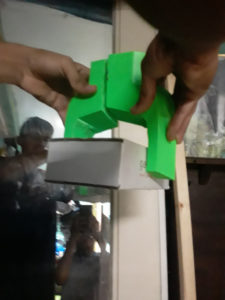
Courtesy of Hugo Ceja
“I grew fascinated by the various ways I could assemble and disassemble parts,” he says. “Through trial and error … I learned how to add the features I looked for and piece together the dimensions for the gripper. It struck me as … beautiful that I could bring this gripper to life in a matter of hours with the 3D printer in my local library.”
But Hugo’s love of his family takes top priority. For example, his mother and father had for years dreamed of going to Las Vegas. One day, Hugo heard his mother dismiss it as just one of those impossible dreams we all have. Hearing his mom say that really irritated Hugo. He hates hearing anyone say something is impossible, so he decided to do something about it. He raised enough money through his various entrepreneurial endeavors to send his parents on their dream vacation. While they were gone, he ran his dad’s taqueria.
It was hard work, he admits. He had to deal with all of the things that small-business people deal with every day, from customer complaints to employee dissatisfaction, but he managed to do it without calling his dad for help, even once, he says. And his mom and dad? Their dream vacation turned out to be all they’d hoped for. In Vegas, they had the time of their lives, strolling arm and arm and soaking up the local color.
As our talk winds down, I ask the young man: What do you see yourself doing in the future? Hugo explains that someday he wants to open a company in AI that will make more dexterous robotic appendages. Here again, his parents figure prominently in his thoughts. Over the years, he’s noticed how tired and sore they are after a long day’s work. Robots at home would help them to be able to pursue their own interests in the evening. His dad, Hugo tells me, has always loved art, while his mom has an interest in psychology, but neither can pursue these activities because work trumps everything and even after work they’re both too worn out. But whatever Hugo ends up doing, he hopes to continue to be very vocal about environmental issues and racial equality.
I wish the young man luck, and we fist bump on one of those last halcyon nights when restaurants and bars were still crowded. Then I receive my to-go order, a gigantic carne asada burrito. And when I get home, I treat myself to an ice-cold cerveza negra and one muy sabroso burrito that no way in the world could my girlfriend and I ever finish at one sitting.
A postscript: First, the good news. A week after I talked to Hugo, he learned he was one of 150 students throughout the country named a Coca-Cola Scholar, which gifted him $20,000 for college, a great and well-deserved honor. Also, he was accepted by Georgia Tech University in Atlanta and Carnegie-Mellon University in Pittsburgh, so now he has to decide between them and the University of Texas in Austin that had already accepted him with a scholarship.
The not-so-bad news: The LatinX Conference has been delayed until October. At this time, it’s unclear if Hugo will be able to attend.
Now for the bad news. A few weeks after we talked, I learned that Hugo was self-quarantining. He had flu-like symptoms. He felt achy and weak. A doctor tested him for a number of different diseases, but not one came up positive. And because he was not over the age of 60 and had no underlying health conditions, the doctor would not test him for COVID-19. And his dad had to shut down, at least temporarily, Dos Amigos.
I felt terrible for Hugo and his family, but, at the same time, my thoughts inched in a more selfish direction. How long had it been since I’d interviewed Hugo? I quickly checked my calendar. More than two weeks. I could stop my deep breathing.
A week later, I texted Hugo to find out how he was doing. When I got his text, I was almost too scared to check, but it turned out to be all good. He was feeling much better. And, Hugo being Hugo, he’d organized a fundraiser to donate N95 masks to hospitals, even feeling well enough to hit me up for a donation.
Fort Worth writer Ken Wheatcroft-Pardue retired from teaching at Carter-Riverside High School in 2013.



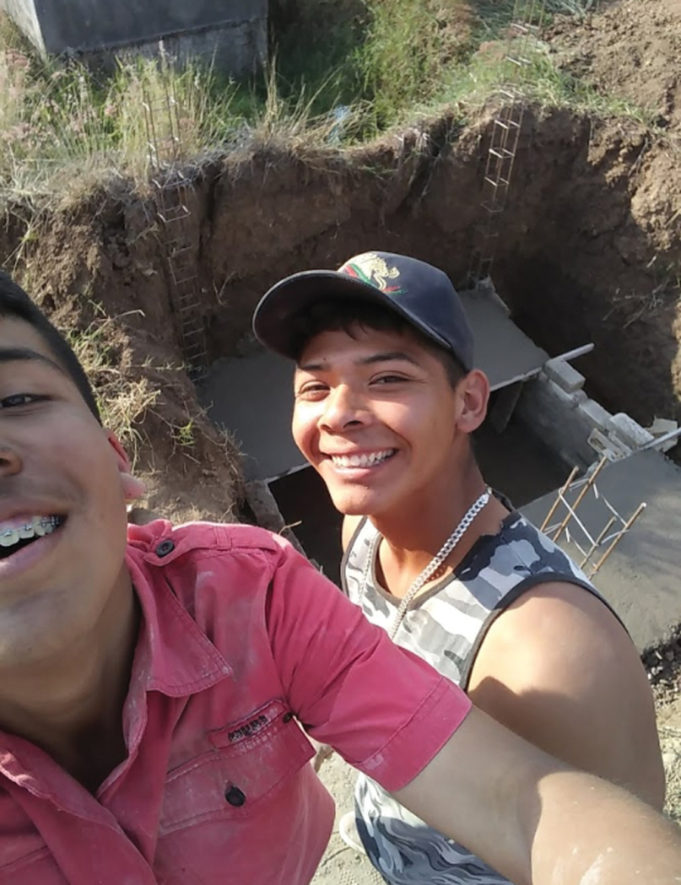
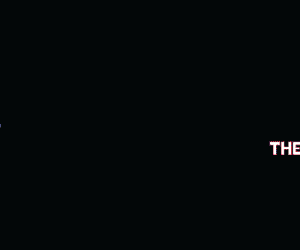

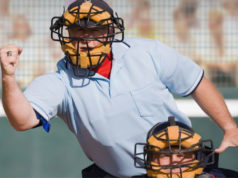
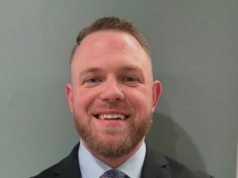





Hugo is bound for good things! He is an exceptional young man.